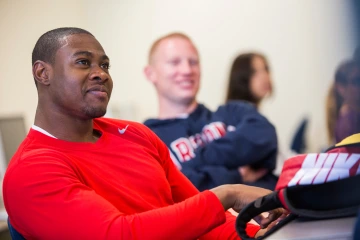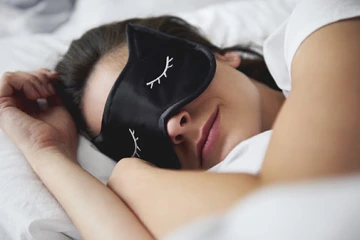Helping Students Navigate Campus Life
Sleep researcher, Dr. Michael Grandner, provides a few pointers on how to make the transition back to campus a little smoother.


Creating a daily routine and practicing good time management are factors to the academic success of college students.
What is the best way for college students to transition back into the school year?
Get into a regular routine, the more consistent you can make your schedule. The more you can build regularity and predictability into your schedule, the easier you will be able to transition. Ironically, this can also help you be more efficient and resilient to curveballs as they are thrown at you!

College students should get about seven to nine hours of sleep. Lack of sleep may affect a student’s health, mood, GPA and safety.
Diet and sleep impacts more than the waistline and energy level. A healthy diet and plenty of sleep are important for maintaining focus, efficiency, mental clarity, emotional regulation, and physical performance.
How can the college lifestyle lead to depression, anxiety, and other behavioral health issues?
There are many things about this experience and the age range that can lead to poor mental health. Lack of healthy diet and sleep, extra stress, looming deadlines, relationship problems, and more. Learning how to manage and cope with the stress is a key part of the experience.

A survey conducted by the American College Health Association, found 25.9% and 31.9% of college students reported anxiety and stress over the past twelve months. Approximately 16.9% reported experiencing depression and 63.2% felt very lonely. Despite these figures, there are many ways to navigate these demands effectively.
If it is interfering with your ability to be productive or gets in the way of your general well-being, then it might be more than just a passing mood. In that case, get help. Students have great access to trained and competent professionals who can help. Depression and anxiety disorders are common, and effective strategies for managing them exist. If you were injured or sick and it got in the way of your ability to function, you would go to a professional. Treat your mental health the same way.
What resources are available to UA students to help them manage their time better, to eat well, and get enough sleep?
Students have access to a wide range of medical and mental health resources through the university, their college, and sometimes even their specific program. Learn what those resources are and make use of them!
About the Author
Michael A. Grandner, PhD, MTR, is the director of the Sleep and Health Research Program at the University of Arizona, director of the Behavioral Sleep Medicine Clinic at the Banner-University Medical Center, and an assistant professor in the Department of Psychiatry at the UArizona College of Medicine - Tucson, with joint appointments in the Department of and Medicine, Psychology (College of Science), Nutritional Sciences (College of Agriculture and Life Sciences), and Clinical Translational Science. In addition, he is a faculty member of the Neuroscience and Physiological Sciences Graduate Interdisciplinary Programs. He is certified in Behavioral Sleep Medicine by the American Board of Sleep Medicine and is a Diplomat in Behavioral Sleep Medicine by the Board of Behavioral Sleep Medicine.
His research focuses on how sleep and sleep-related behaviors are related to cardiovascular disease, diabetes, obesity, neurocognitive functioning, mental health, and longevity. Current and recently-completed research projects were funded by the National Institute on Minority Health and Health Disparities (NIMHD), the National Heart, Lung, and Blood Institute (NHLBI), the National Institute for Environmental Health Sciences (NIEHS), the American Heart Association (AHA), the National Collegiate Athletics Association (NCAA), and other organizations.

